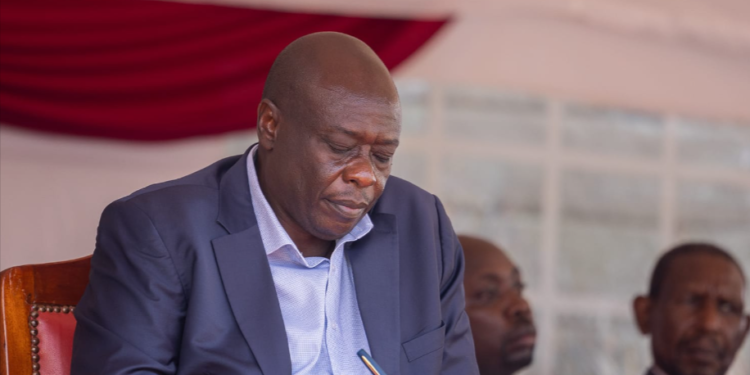Deputy President Rigathi Gachagua has been impeached by the National Assembly following a decisive vote on Tuesday. The motion, which passed with an overwhelming majority of 281 votes in favor, 44 against, and 1 abstention, now moves the impeachment process to the Senate for further deliberation and a final verdict.
The impeachment comes after weeks of mounting allegations against Gachagua, ranging from gross misconduct and constitutional violations to economic crimes. The motion, initially filed by Hon. Mutuse Mwengi, MP for Kibwezi West, detailed a litany of accusations that have now culminated in this historic vote.
National Assembly Speaker Moses Wetangula is expected to notify his Senate counterpart of the vote within two days, setting in motion a 10-day countdown for the Senate to conduct a trial and cast their own vote on Gachagua’s fate.
The charges against Gachagua are both numerous and severe. At the heart of the impeachment motion are allegations of ethnic discrimination, misuse of office, and corruption that reportedly spans the two years since he assumed office. The Deputy President stands accused of violating key constitutional provisions, including Articles 10, 27, and 73, which enshrine the values of patriotism, non-discrimination, and integrity in public office.
One of the most damning pieces of evidence presented in the motion was a public statement attributed to Gachagua, where he allegedly likened government resource distribution to company shares. “A government is like a company. There are shares, and those with the most shares get the most benefits,” Gachagua was quoted as saying, implying that communities would receive benefits based on their voting patterns in the 2022 general election. This statement, among others, has been interpreted as a direct threat to national cohesion and a violation of constitutional principles.
The impeachment motion also accuses Gachagua of undermining the Cabinet’s collective responsibility. In one instance, he publicly dismissed government-approved plans for evacuating residents along the Nairobi River, a project aimed at mitigating climate change impacts. This contradiction of official policy reportedly created confusion and discord within the government ranks.
Perhaps the most financially damaging accusations against Gachagua involve alleged economic crimes, including money laundering and corruption. The motion outlines a complex web of businesses and proxies allegedly used to launder money and conceal ill-gotten gains. Companies such as Spirit Way Limited and Fortis Vis Group Limited, linked to Gachagua’s family members, are said to have amassed vast wealth through illicit means.
The impeachment document presents evidence of Gachagua’s rapidly expanding business empire, which reportedly includes high-profile properties such as Treetops Hotel in Nyeri and Vipingo Beach Resort in Kilifi County. These acquisitions, along with numerous other real estate holdings across Nairobi, Nyeri, and Kilifi, are alleged to be the proceeds of corruption and influence peddling.
Suspicious financial transactions have also come under scrutiny. One such transaction involves Agrobriq Investment Limited, a company tied to Gachagua, which reportedly received KES 55.5 million from the Deputy President’s office for renovations to his official residence in Karen. The funds were allegedly laundered through multiple channels, raising further suspicions of financial misconduct.
Beyond financial impropriety, Gachagua stands accused of abusing his power to influence state institutions for personal benefit. The motion claims he coerced procurement officers and other public officials to award contracts to companies linked to his associates and family. Additionally, he allegedly interfered with county government functions, particularly in Nairobi City County, where he is accused of unlawfully directing market relocations and undermining devolution.
The Deputy President’s treatment of public officials has also come under fire. The motion accuses Gachagua of bullying and harassing state officers, especially within the security services, subjecting them to public humiliation and threats if they failed to comply with his directives.
As the impeachment process moves to the Senate, all eyes are now on the upper house to see if they will uphold the National Assembly’s decision. The Senate’s verdict will determine whether Gachagua becomes the highest-ranking Kenyan official to be removed from office through impeachment, marking a significant moment in the country’s democratic history.












